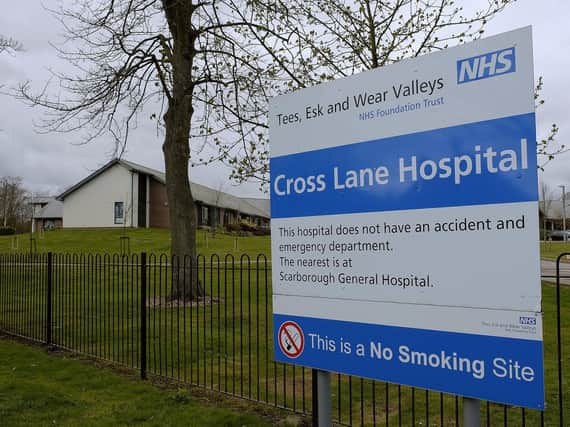Some services at Cross Lane Hospital in Scarborough rated as 'inadequate' by CQC


The CQC has taken action to keep people safe following an unannounced focused inspection of five acute wards for adults of working age and psychiatric intensive care unit services at Tees, Esk and Wear Valleys NHS Foundation Trust.
The inspection
The inspection in January was prompted by an incident that had a serious impact on a person using the service which raised concerns about the safety and quality of the service.
Advertisement
Hide AdAdvertisement
Hide AdThe CQC said there was a potential risk of harm to patients if they did not inspect.
Inspectors visited five wards - one at Cross Lane Hospital, three at Roseberry Park in Middlesbrough and one at West Park Hospital in Darlington and looked at whether the service was safe and well-led.
Both of those key questions have been rated as inadequate, with an overall rating for the service as Inadequate.
At the previous inspection in March 2020 the service was rated Good.
Advertisement
Hide AdAdvertisement
Hide AdThe overall rating for the trust as a whole of requires improvement remains unchanged by this inspection.
The CQC has served the trust a section 29A warning notice – meaning that it must urgently address these issues to keep people safe to avoid more significant enforcement action and has a timeframe it must do this within.
The findings
CQC’s head of hospital inspection for the north (mental health and community health services), Brian Cranna, said: “During our inspection of Tees, Esk and Wear Valleys NHS Foundation Trust’s acute wards and psychiatric intensive care unit service, we found concerns that urgently needed addressing.
“We found these five wards were providing a service where risks were not assessed effectively or managed well enough to keep people safe from harm. In particular, staff did not fully understand the complex risk assessment process and what was expected of them.
Advertisement
Hide AdAdvertisement
Hide Ad"The lack of robust documentation put people at direct risk of harm, as staff did not have access to the information they needed to provide safe care."
She continued: “It was also concerning that governance systems had not ensured staff understood when and how to observe and engage with people who used the service, and that leaders had not taken action to ensure staff were supported to keep people safe.
“The trust know what improvements must be made and we continue to monitor the service closely and will return to check on their progress.”
In the CQC's report of their findings from the inspection it states that staff did not assess and manage risks to patients well or use a system that was robust enough to assess patient risk effectively.
Advertisement
Hide AdAdvertisement
Hide AdIn addition inspectors saw three different meetings in place where patient risk was discussed between the multi-disciplinary team and the nursing team. However, inspectors found that the information in handovers and risk documentation did not match for 11 of the 16 patients that were reviewed.
The wards did not have a good track record on safety, and the service did not manage patient safety information well. In particular staff were unable to describe any communication from leaders to alert them to areas of risk following a recent serious incident.
The trust must now make several improvements to comply with the section 29A notice.
The response
In response to the report, trust chief executive Brent Kilmurray said: “We fully accept the issues raised in the report and have taken immediate action. As a result, we already have a better environment for patients on our wards.
Advertisement
Hide AdAdvertisement
Hide Ad“We have also provided assurance to the Care Quality Commission (CQC) that effective systems are in place in our wards and that further improvements will be made across our services, with work already underway.
“The report has rightly highlighted issues we had already identified as needing improvement and we were already working to address them. A huge amount of work has taken place since the CQC visited our inpatient wards in January and we’re continuing to make improvements for the benefit of our patients and staff.
“To support that, we will be spending £3.6 million on recruiting 80 more care staff across our inpatient wards. We are also making significant investment in technology that will free our people to spend more time on patient care.”
The trust says it has accepted a need for greater clarity, improved processes and training, and better communication so its staff can deliver patient risk assessments appropriately and consistently.
Advertisement
Hide AdAdvertisement
Hide AdAfter the CQC’s initial findings in late January, the trust took the following measures:
- A rapid improvement event for staff to ensure potential risks were addressed urgently and risk assessments improved.
- Requested and received additional high-level external expertise to implement changes.
- Introduced daily safety briefings and “secret shoppers” to monitor improvements.
- Received approval to recruit 80 more staff.
Advertisement
Hide AdAdvertisement
Hide Ad- Accelerated expenditure on a new patient data system which speeds up and simplifies access for trust staff.
- Wider introduction of patient monitoring technology to improve ward safety.
The trust’s improvement programme for its acute wards will be overseen and reviewed by an external quality assurance board which includes representatives from NHS England and Improvement, commissioners and the CQC.